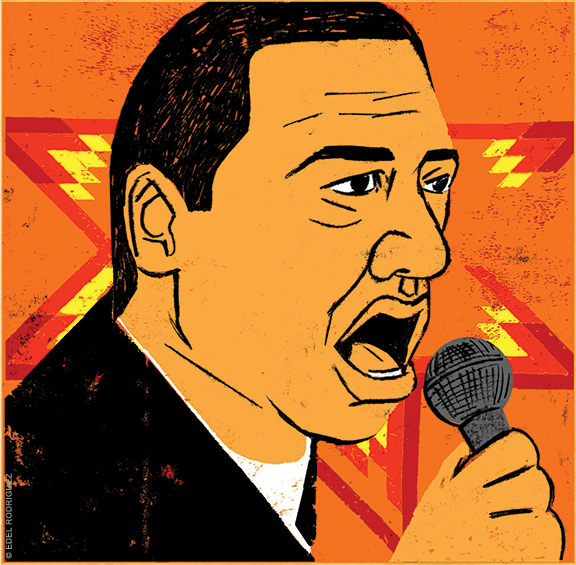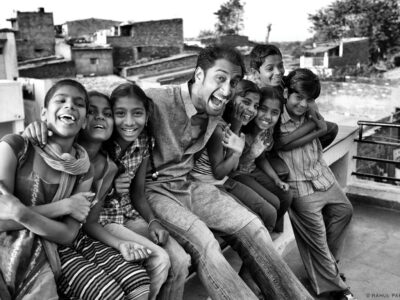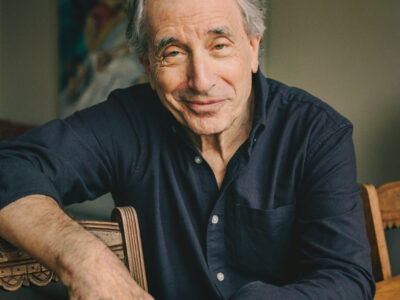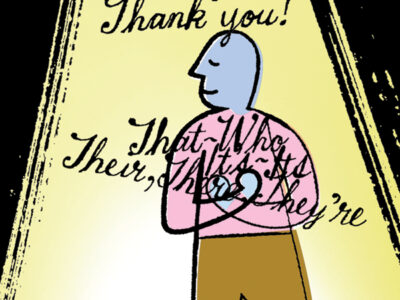
Class of ’15 | Talon Ducheneaux C’15 was 15 years old, grieving at a memorial for his cousin Zane, when his grandfather pulled him aside.
Ducheneaux sensed a lecture coming on the dangers of hip-hop. Lately he’d been writing songs and even recording a few mixtapes, but most of his family disapproved. This was the Midwest, where country music flooded the radio, and where hip-hop was often linked with troubled. A few meddlers had already told him they didn’t like where he was going with this rap stuff.
But his grandfather surprised him that day. He didn’t lecture or convince or criticize. He simply asked a question: “Do you have a song you can perform for Zane?”
“I had to put my eyes to the ground and shame myself out,” Ducheneaux remembers, “because I didn’t.”
In those days, despite his prolific lyric-writing, “I wasn’t saying things that actually meant much,” he admits. When he got home from the memorial that night, he wrote a song dedicated to Zane and recorded it. The whole process took about 20 minutes.
“I saw how easy it was to just speak truth,” he says. “Then I started thinking: I have this medium that I can use to not only connect with other people who are going through these things, but also to educate people who aren’t familiar with them.”
A Native American who grew up on South Dakota reservations and watched his parents spiral into alcohol addiction, Ducheneaux now uses music to tell his stories—and to heal from the past.
At 22 years old, he has put out 14 solo digital albums under the name BazilleDx, all available for free online. He has also compiled some of the lyrics into books of poetry. Many of his songs dig into personal experiences and traumas: nights of parental neglect, coping with death, role models both positive and negative, feelings of hopelessness.
“You listen to those struggles and think, how did someone rise up in spite of all that and do all the things he’s done?” says Valerie De Cruz, director of the Greenfield Intercultural Center, where Ducheneaux worked throughout his time at Penn. “I think it’s music that nourishes him in many ways. It helps him make sense of his stories. It empowers him.”
As for choosing hip-hop as his medium, Ducheneaux says he’s been a fan for most of his life. (He remembers his father confiscating an Eminem CD when he was in first grade; he put on Will Smith instead.) When he reached middle school and began to understand more of the lyrics, he recognized his own experience in the music of Tupac Shakur and other rappers.
“To me, lyrics from Tupac in the ghetto with simple translation equated to a lot of things we were facing on the reservation,” he says. “The context was very similar to our context in terms of the police don’t like us, the government doesn’t like us, the majority of America doesn’t like us. Hip-hop came from the same struggles we faced. It just clicked.”
The genre felt even more personal when he discovered its growing indigenous presence.
“When I was growing up, to be Native wasn’t really seen as a victorious thing,” he says. “As I started seeing what indigenous people were doing with hip-hop, I was like, we have the opportunity here to really instill pride in each other, and to be proud of the beliefs and morals we have.”
Music of all genres became Ducheneaux’s escape in an increasingly unstable home. He saw playlists in every situation: walking to class, falling in love, nursing a broken heart, even falling asleep. “If I could find the perfect soundtrack for something that happened that day, it meant a lot,” he says.
As he launched a college search, he had only two questions for each university: did they have a psychology department, and was there a campus radio station?
He found both at Penn, and quickly joined WQHS. His show “The SlapBack!” began as “the stereotypical Native hip-hop show,” he says, but then he expanded it to include hip-hop in general.
As a sophomore, Ducheneaux helped organize the All-Ivy Native Conference at Penn, focusing on indigenous hip-hop and its potential for positive change. He put a similar event together in March to complement the Penn Museum’s exhibition Native American Voices.
Under the title Modern Native Voices: The Medium of Hip-Hop, the day included a spoken word performance, a panel discussion, and a hip-hop concert, all held in the Museum, and all according to Ducheneaux’s vision. He looked thrilled to be sitting on stage that afternoon, leading a discussion with some of his hip-hop idols—Native performers who he says promote respect for women, social justice, and saving the environment in their music.
“As emcees, you’re supposed to educate people and tell them what’s happening,” he says. “A lot of what the Native presence in hip-hop can do is shed light on things. We should be reminding each other, hey, this is still an issue and we need to work on it.”
Both hip-hop events also tied into Ducheneaux’s broader goal when he came to Penn: to “bring a voice that wasn’t as prevalent.” He wanted to set an example, he says, and “show kids from back home that you can come to a place like this and make it.”
“Back home” is still on his mind, even as he plans to pursue a PhD in psychology. Ultimately, he’d like to return to Midwestern reservations and work with kids there, possibly in an after-school poetry program.
But regardless of his eventual job title, he knows he’ll keep making music—in fact, he recently resurrected The SlapBack as a podcast, and in July, released yet another album.
“Everyone has that thing that helps them hold on, and for me, that’s always been music,” he says. “I honestly feel like music has been the one thing that hasn’t turned its back on me yet. I’ve cried both tears of happiness and sadness into it, imagined life and death with it, and every instance of it has brought some amount of resilience and continuation to my life.”
—Molly Petrilla C’06




